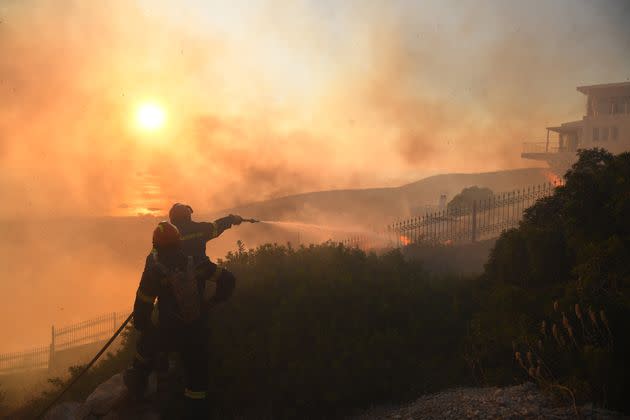This Global Heatwave Has Everyone Asking The Same Question

Firefighters extinguish a house burning during a wildfire in southeast Attica in Lagonisi, Greece on 17, July 2023.
Extreme weather is causing alarm around the world right now, and Twitter is asking: how much more can we endure before we act?
Record-breaking temperatures – believed to be a result of the climate crisis – have made global headlines in recent weeks, with heat health alerts issued in both Italy and the US.
The Italian island of Sardinia is expecting highs of 46C on Tuesday afternoon, with another 10 days of heat on its way.
In Spain, temperatures are forecast to reach 44C in the south on Wednesday, while wildfires have been sweeping across the Spanish island of La Palma and mainland Greece due to the hot, dry weather conditions.
Other wildfires have been raging across 100 hectares in southern Switzerland, exacerbated by high speed winds.
Over in the US, temperatures last night in California’s Death Valley were at 49C at midnight, while Phoenix, Arizona, logged its 16th day above 43C.
The World Meteorological Organisation (WMO) has pointed out that this extreme weather is proof more action is needed to address the climate crisis.
In a statement sent out to journalists on Tuesday, it said: “Temperatures in North America, Asia, and across North Africa and the Mediterranean will be above 40C for a prolonged number of days this week as the heatwave intensifies.”
Meanwhile, heavy rainfall is hitting other places in the world, hard, such as Japan, South Korea and the north-east of the US.
And we should not be turning a blind eye.
As the WMO secretary general Professor Petteri Taalas said: “The extreme weather – an increasingly frequent occurrence in our warming climate – is having a major impact on human health, ecosystems, economies, agriculture, energy and water supplies.
“This underlines the increasing urgency of cutting greenhouse gas emissions as quickly and as deeply as possible.”
However, scientists have been warning for decades that carbon emissions from burning fossil fuels will cause climate change, making heatwaves more regular and more intense – while also exacerbating other weather patterns, like heavy rainfall.
But, as Twitter asked, what will it take for humans – and governments – to stop being in denial and to start taking action?
🔥Just wondering: what global temperature will make us stop burning fossil fuels? ⛽️❌#globalwarming#heatwavehttps://t.co/av7wKrtSz0
— Jeroen Hinfelaar (@jeroenhi) July 18, 2023
Brits declaring 40 degrees by the pool is 'bliss'; news titles issuing fun 'What to pack for 45-degree heat' guides... there is some serious Don't Look Up stuff going on with this European #heatwavehttps://t.co/PD7zSZ1GaO
— Lucy Thackray (@LucyInTheSky22) July 18, 2023
https://t.co/tNuHMIUycE
Serious talks on climate change need immediate global action.@MerlinofCanada@RetiredCdnRJB@ThesisPi@intouchwit— Eros Hazel Gloreen Immaculata (@HazelEros) July 18, 2023
The relationship between economic growth and climate change is now very apparent. Growth is literally killing us by heating the planet. So when are we going to abandon growth as a goal?
— Richard Murphy (@RichardJMurphy) July 17, 2023
This total madness happening to the 40,000,000 km² of the North Atlantic Ocean surface is getting worse, as we expected.
Many are still in denial.
But we are all finding out together as we go. pic.twitter.com/C50i94DC0V— Leon Simons (@LeonSimons8) July 17, 2023
I commented on the new National Adaptation Plan till 2028(!) It's a year on from the 40'C #heatwave in the UK, there's multiple global heatwaves right now. But the policy is underwhelming esp. for overheating and heat despite the clear evidence. #ClimateAction#scicommhttps://t.co/4PR7c5WClD
— Dr. Chloe Brimicombe (@ChloBrim) July 17, 2023
Extreme global weather. Unprecedented heat wave sweeping through the earth planet.
When was it like this ?
Most of the areas are experiencing above 40 degree Celsius. People are drinking more water. Tourists in Europe are worst affected. Do some thing to prevent emission.— Dr M.H.Swaminath. (@HSwaminath) July 18, 2023
From withering heat wave to extreme flooding, rich countries in the global north are experiencing what it feels like to live the #ClimateCrisis.
This is a daily reality for people in the global south. #ClimateChange is not something for the future. We need a global action NOW!— Moulid Hujale (@MoulidHujale) July 18, 2023
How can anyone still be surprised by this? We've been getting warnings since the 1980s https://t.co/f8NQ4LTvRY
— KeepOutNats&Act (@NoFloatingVoter) July 15, 2023
What is Global Heat Wave Telling Humanity?🔥
— bukar danyaya (@BukarDanyaya) July 18, 2023
The northern hemisphere is experiencing the worst heatwave on record and temperatures are reaching unprecedented heights...I dunno, call me crazy but it's almost as if there was some kind of 'climate change' going on.
— Glenn Evans (@vinylsol) July 18, 2023
World leaders cannot fold their hands and do nothing about the impending danger caused by the global anthropogenic CO2 emissions. The catastrophic consequences of this is the observed unprecedented temperature rise, and the natural disaster that's occurring globally.#HeatWave
— Christian (@DRCHRISONWE) July 18, 2023
Struggling through another record-breaking heatwave? Thank a fossil fuel executive. https://t.co/Xg1JSsZBgO#climatechange#climateaction@green4ema
— Debbie Levin (@DebbieatEMA) July 17, 2023

 Yahoo Finance
Yahoo Finance 